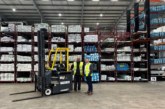
In today’s challenging market conditions, NMBS CEO Chris Hayward argues that being “proactive in the face of a crisis” offers independent merchants the best chance of success.
Recessions are often viewed in the merchanting sector as something we must simply weather. A time to put your head down, tighten your belt, push on and get through. But this can mean missing invaluable opportunities to ask testing questions of the business that produce operational efficiencies and future profit.
Having worked within the sector through two – likely soon to be three – recessions, they all bear the same hallmarks. Slowdowns in construction and plummeting business confidence have commonly resulted in problems for our industry around reduced retail sales and cash flow issues, as well as unaffordable materials supplies, redundancies and cuts in investment.
At NMBS we regularly meet with small groups of merchant members to discuss their concerns and look at ways we can support them through the services we provide. Recently, in light of inflationary projections and the toughening economic climate ahead, we posed the question, ‘What is currently keeping you awake at night?’
Understandably, spooked by current media headlines, members expressed their concerns about cashflow, late payments and possible bad debts, rising energy and wage costs, increased interest and exchange rates, and price inflation masking the true story of falls in sales volume. Others are still experiencing recruitment and labour problems as well as significant Covid-19 absences.
Recent Office for National Statistics figures reflect this outlook by showing a 1.4% drop in construction output during June, after seven months of growth. This latest blow follows more than 12 months of product supply issues, high import costs and the effects of the war in Ukraine, all of which are continuing to cause waves.
It is unusual to have so many potential headwinds, although it is possible to find opportunities as well as threats. Discussions with NMBS members show businesses are already finding ways to get ahead. These are the tips they’re sharing:
Look after staff. Perhaps the most important on the list. Great people are hard to find and many merchants are looking for ways to support their workforce by considering a balance of pay increases with one-off cost of living bonuses. They are weighing up how best to boost employees’ financial security within what the business can afford, while assessing the cost of locking in higher wage costs at the brink of a recession. Meanwhile others, where possible, continue to offer working from home or hybrid options, both to increase employee choice and wellbeing, while driving down business costs. Focusing on building the ‘employer brand’ is helping to keep good workers loyal.
Keep talking. Our merchants are trying to strike a careful balance of nurturing long-term working relationships with suppliers, while also negotiating on price and payment terms. Many are exploring how to re-examine rebate targets with suppliers to avoid a situation of drastic price cuts if they are to meet volume targets for 2022. Others are having to chase payments with customers, who themselves have cashflow concerns, without compromising future business. The key to success is to keep talking to build mutual trust and understanding.
Managing Stock Levels. Independents are known for having good stock levels. However, as demand slows and prices move both up and down, many are trying to avoid locking in too much cash in stock. This avoids a situation where if prices fall, the selling price would drop below the cost of purchase. While products where a lot of energy is used in the manufacturing process are unlikely to drop in price – regardless of demand, care must be taken with products like timber, where prices can wildly fluctuate depending on various global market conditions.
Check utility contracts. Many merchants are frantically checking when their energy supplier contacts are up for renewal. Some are already reporting bills expected to rise by more than 400% in the next 12 months. The opportunity to negotiate better terms or move energy supplier are extremely difficult at the present time, so businesses are choosing to look at any energy efficiency measures they can take which would bring permanently lower bills for the future.
Manage Fuel Costs. Driven by the same factors as rising energy costs, many merchants may have reached a tipping point where the direct cost of delivery can no longer be built into their prices. While a proportion already charge for delivery, some are now adding it in the form of an environmental surcharge or linking it to providing guaranteed next day delivery. Others have bitten the bullet and added a cost stating it is directly linked to rising fuel costs.
Maximise online systems. These can bring transformational time and cost efficiencies, including the use of online ordering and product information management (PIM) services, such as those NMBS offers through OnePlace. Merchants are also protecting themselves with increased cyber security, even working towards Cyber Essentials accreditation.
Look towards future markets. Merchants seeking to save energy costs within their own businesses by installing more insulation, energy efficient windows and doors, are also finding these are product areas where there are more opportunities to boost their own product sales over the coming months. This is reinforced by changes in building regulations forcing more energy efficient commercial and residential buildings, and by retrofit programmes designed to counter the steep rise in energy prices. Put simply, the sorts of products and advice that customers need is changing. Well-prepared merchants are gearing up for increased demand for loft insulation, heat pumps, PV, hydrogen-ready boilers, more energy efficient building materials and higher quality glazing.
Though the current outlook is bleak, previous recessions have shown us that independent builders’ merchants who thrive are those who are proactive in the face of a crisis. They work collaboratively up and down the supply chain to free up cashflow, find operational efficiencies, get their own house in order, and offer the market what it wants and needs in ever changing and difficult times.
Click here for more information from NMBS.









